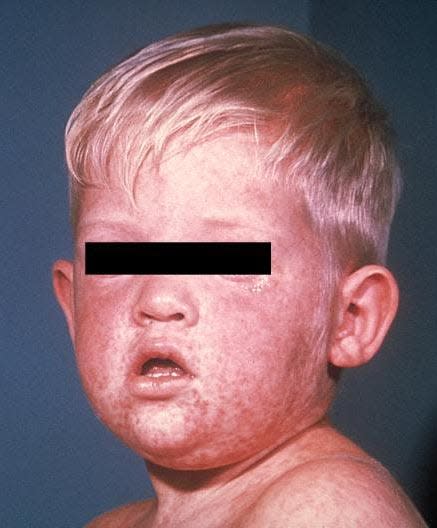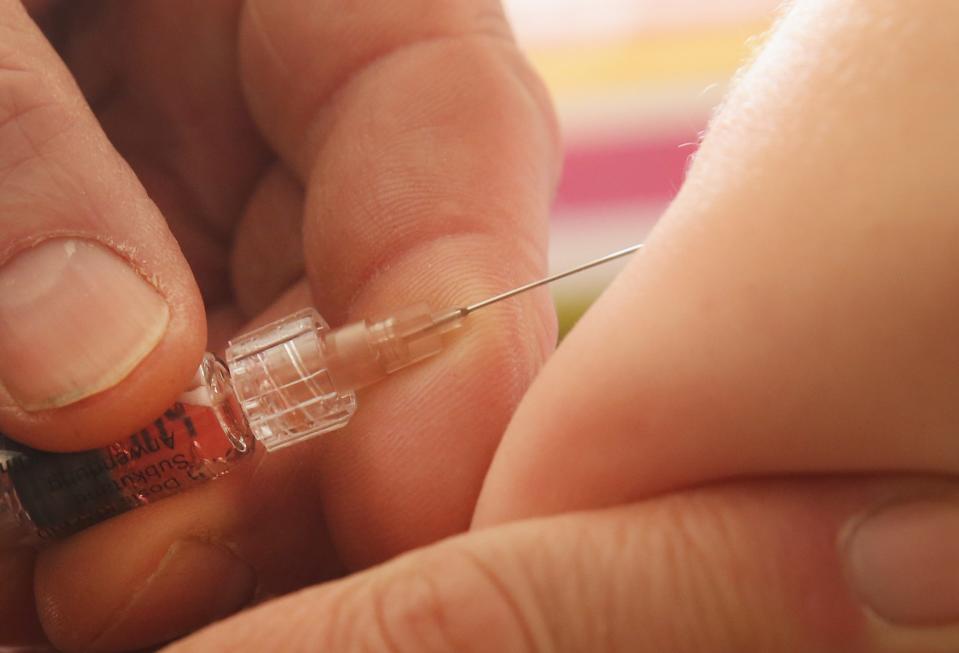Detroit child with measles exposed others at Children's Hospital, urgent care, pharmacy
A 4-year-old from Detroit has a confirmed case of the measles, and potentially exposed others while seeking treatment for the highly infectious virus at DMC Children's Hospital of Michigan, an urgent care center and a pharmacy in the city, the Detroit Health Department announced Wednesday.
It is Michigan's fifth documented measles case this year.
The child was unvaccinated, said Dr. Claudia Richardson, the city health department's medical director, and had no history of international travel. Measles is so contagious, 90% of unvaccinated people who are exposed to the virus will become infected.
City health officials said they are working with the state health department to investigate where the child might have been exposed to the virus. So far, however, the case appears to be isolated, Richardson said.

"This is definitely an ongoing investigation," she said, "so we're in the middle of that. At this time, we do not have a source of the infection."
The child was not hospitalized, Richardson said, but was treated in the emergency department at Children's Hospital and is now following isolation protocol.
Anyone who was at the following places at these times and dates may have been exposed to the virus:
From noon to 3 p.m. April 1 at Acadian Urgent Care, 2117 Springwells, Detroit.
From 1:45-4 p.m. April 1 at the Rite Health Pharmacy, 5851 W. Vernor, Detroit.
From 5-10 a.m. April 3 in the emergency department at DMC Children’s Hospital of Michigan, 3901 Beaubien Blvd., Detroit.
Children’s Hospital of Michigan did not respond to questions from the Free Press about how many people may have been exposed to the measles in the emergency department on April 3 or about how the hospital is notifying them.
Health leaders urge anyone who might have been exposed to the virus April 1-3 to monitor themselves for symptoms for 21 days. If symptoms develop, call ahead before visiting a doctor, urgent care center or hospital emergency room so precautions may be taken to avoid exposing others.
"We're ... doing our routine communicable disease investigation, which requires us to reach out to anyone that may have had direct contact. So far, all we know are family members," Richardson said, adding: "We are trying to get the word out the best we can."
What are the symptoms of measles?
Measles symptoms typically begin seven to 14 days after exposure, but can first appear as long as 21 days after exposure and can include:
High fever that could reach 104 degrees or higher.
Cough.
Runny nose.
Red, watery eyes (conjunctivitis).
Tiny white spots on the inner cheeks, gums and roof of the mouth called Koplik Spots, which usually appear two to three days after symptoms begin.
A rash that starts on the face and spreads to the trunk, arms and legs, typically three to five days after symptoms begin. The rash is red, raised and blotchy.
"Infected people can spread measles before noticing any symptoms, including four days before and four days after the rash appears," Denise Fair Razo, chief public health officer for the Detroit health department, said in a statement. "Our best advice is to get vaccinated against measles if you have not already done so. It is part of the two-dose measles, mumps, rubella (MMR) series of childhood vaccines."
2 doses of MMR vaccine are 97% effective at preventing measles
Measles infections are preventable with widespread vaccination. Two doses of the measles, mumps and rubella vaccine (MMR), offer 97% protection from infection. A single dose is about 93% effective.
However, in Michigan, immunization rates have fallen to 66% among Michigan toddlers — the lowest point in more than a decade for recommended childhood immunizations, according to MDHHS.
More: Measles cases send Michigan health authorities scrambling to avoid bigger outbreak
What is the recommendation for measles vaccinations?
The U.S. Centers for Disease Control and Prevention recommends:
A first dose of the MMR vaccine for children ages 12-15 months old, with a booster dose administered between ages 4 and 6.
Anyone born in or after 1957 without evidence of immunity against measles or documentation of having been vaccinated with two doses of MMR vaccine should get vaccinated.
Two doses are recommended for adults at high risk, such as international travelers, college students and health care personnel born during or after 1957.
People exposed to measles who cannot document immunity against the virus should get post-exposure prophylaxis — a dose of the vaccine to potentially provide protection within 72 hours of initial exposure, or immunoglobulin within six days of exposure.

How serious is a measles infection?
Measles can cause serious illness, long-term disability and death in people of all ages.
About 1 in 5 people who get the measles end up hospitalized, according to the CDC, and 1 in 20 kids with measles develops pneumonia. Roughly 1 out of every 1,000 children who have measles infections will also have encephalitis. Brain swelling from encephalitis can lead to convulsions, permanent hearing loss, intellectual disability and death.
Anywhere from 1 to 3 out of every 1,000 children with measles dies from respiratory or neurologic complications from the virus.
"We've had the vaccine since 1963, and before the vaccine was available, every year across the U.S., between 400 and 500 people died," Dr. Natasha Bagdasarian, Michigan's chief medical officer, told the Free Press for a previous article. "Four hundred to 500 people may not seem like ... huge numbers, but it is a lot, especially if you're talking about your loved one or your child."
Notification too late for post-exposure treatment
The Detroit child's measles case was confirmed Tuesday, Richardson said, but public notification was not made until Wednesday afternoon, when anyone who was potentially exposed to the virus would be outside the window for treatment with post-exposure prophylaxis to prevent infection.
A dose of the MMR vaccine can be administered 72 hours of initial measles exposure and immunoglobulin can be given intravenously within six days of exposure to potentially prevent illness, according to the CDC.
By Wednesday afternoon, that window had closed.
"We are out of both of those windows and ... we were going through the dates very rigorously," Richardson said.
What can be done now, she said, is to educate the public about the potential exposures, what to do if they develop symptoms, and to urge vaccination.
"That's where we're focusing," Richardson said. "When situations like this arise, it brings preventable diseases such as measles to the forefront. ... It's the perfect opportunity for us to stress the importance of vaccination."
More: State's top doctor: Measles outbreak likely in Michigan because of low vaccination rates
The Detroit Health Department offers vaccinations for measles and all childhood vaccination series, plus COVID-19, flu and Mpox at its Immunizations Clinic at 100 Mack Ave. Hours are: 8:30 a.m.-4:30 p.m. Mondays-Fridays by appointment. Walk-ins are welcome from 9 a.m.-3 p.m. Late hours are available on the first and third Thursdays of each month, when the clinic is open 10 a.m.-6:30 p.m.
To learn more or to schedule, go to: www.detroitmi.gov/health or call 313-876-4667.
Michigan is not at outbreak status
This is the fifth known measles case in Michigan in 2024.
Two cases were identified in March in Washtenaw County. The second person is believed to have been exposed to the virus at Trinity Health Ann Arbor's waiting and triage area, where another Washtenaw County resident contagious with measles had gone for care.
An adult from Wayne County who had traveled internationally and had no record of measles immunization had the virus in February.
An Oakland County child who was unvaccinated and had traveled internationally was the first known case of measles in Michigan this year, state health officials announced Feb. 23.
Although Michigan health leaders have reported five measles cases since February, the situation doesn't yet rise to the level of an outbreak, according to the definition set by the CDC, which identifies an outbreak as a chain of transmission including three or more cases linked in time and space.
As of April 4, there have been 113 cases of measles in the U.S. this year, according to the CDC, and 58% of the people infected with the virus nationally in 2024 have been hospitalized for isolation or for management of measles complications.
Among those 113 cases, the CDC has recognized seven measles outbreaks, which include 73% of cases identified in 2024.
Comparatively, there were 58 total U.S. measles cases in 2023 and four outbreaks.
Contact Kristen Shamus: kshamus@freepress.com. Subscribe to the Free Press.
This article originally appeared on Detroit Free Press: Detroit child with measles exposed others at 3 locations: What to know

